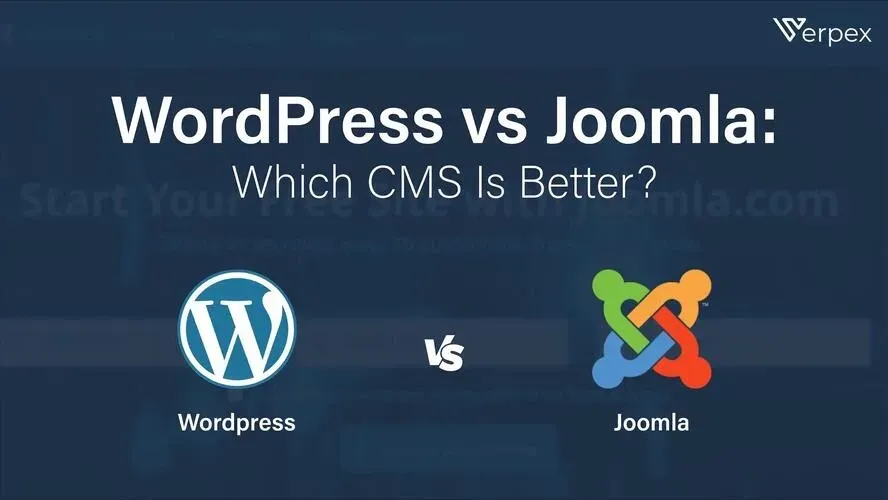How do you pick a content management system for your website when there are so many platforms to choose from?
WordPress and Joomla are two CMSs that immediately stand out among the others in their popularity and market share.
If you’re a beginner looking for ease of use and a large community, then WordPress could be your best option. However, If you’re more technically savvy and looking for flexibility and better user management then Joomla is definitely one to be considered.
When choosing a content management system for your business take the time to think about:
What CMS features are essential for your website?
What products are out there and what can each product offer you?
Which CMS best aligns with your business goals
What is WordPress?
WordPress is a CMS launched in 2003, used by 41.5% of all the websites on the internet, and it still continues to grow in popularity. It was first considered as a blogging platform, but now, you can create any kind of website.
What is Joomla?
Joomla is a CMS launched in 2005, making it nearly as old as WordPress. According to Builtwith, Joomla is used by 2.1% of the websites around the world. It was launched with the aim to provide users with a scalable way to build their websites.
WordPress vs Joomla: Common Features
Free to download and install – WordPress and Joomla are free to download and install. The difference in price comes up when we take into account some other things, like hiring a developer to work on the website or getting a plugin you might need.
Customized appearance – You can customize the aesthetics of your website through templates on Joomla, and through themes on WordPress
Offer multiple add-ons – Both platforms offer add-ons you can use to extend your website, the only difference is Joomla calls them extensions, while WordPress calls them plugins.
WordPress vs Joomla: Difference
Support community – WordPress is known for a huge community ready to offer help, from developers to Facebook groups and forums
Multilingual support – Joomla has built-in multilingual support, while for WordPress you need to use a third-party plugin.
Development costs – The huge community we mentioned that WordPress has also means you can get development work for lower costs than Joomla.
WordPress vs Joomla: Point by Point Comparison

1. Popularity
Like we had previously mentioned, WordPress powers 40% of the websites on the internet, while Joomla powers around 4% of them.
Even though there is a popular myth that Joomla is disappearing from the world of CMS, Joomla is now more stable and powerful than ever.
However, when it comes to popularity, the clear winner is WordPress over Joomla, leading a larger market share of the content management system market.
2. Type
One of the differences between these two platforms is that at the beginning, WordPress started out as a blogging platform, while Joomla was meant to serve websites that are portal-like.
From a technical standpoint, both of the platforms work only when they are installed on a web server. When creating a website, you need to think about how comfortable you are with dealing with the technical aspects of the process, working with servers, web software configuration, and so on.
Joomla is seen more as software for those who are more experienced, while WordPress is more beginner-friendly.
3. Installation

With WordPress, you can create a website with content that will be up and running in just a couple of hours. The WordPress interface is pretty easy to navigate and most users can start creating content right away. The WordPress Customizer offers code-free theme changes, which are very helpful.
Joomla uses a combination of Categories and Articles, so before creating content you’ll need to create categories for your content. Even though it’s not difficult, the process is a bit more complicated than WordPress.
To summarize, the installation process for WordPress is easier, especially for those who aren’t developers.
4. Search engine optimization
When it comes to SEO, there are some great plugins that make advanced SEO very easy in WordPress. Also, WordPress lets you create tags for posts, while Joomla doesn’t allow you to do that without an extension.
Joomla on the other hand, has a great potential to rank very high if your website is set up properly. However, the process isn’t as user-friendly as it is with WordPress.
In terms of SEO, with WordPress you can get quite high rankings, even if you’re totally new to building websites, which isn’t the case with Joomla.
5. Ease of use
As we previously mentioned, WordPress is well-known for its fast and upfront installation process. After your first login, it doesn’t take too much time before you start understanding the basics of this platform. Everything easily makes sense because the entire system is user-friendly.
Joomla is quite simple as well, with an installation process that is quite similar to WordPress’. However, after the installation, the control panel that lets you manage the website isn’t so easy for beginners.
So, unless you have knowledge in building websites, Joomla is going to take a lot more time to understand.
6. Security

Since WordPress is such a popular platform, it often happens that hackers target sites on WordPress for Trojan attacks, malware, hacking attempts, and data breaches. Even though WordPress offers lots of extensions and plugins, you can’t make sure that each of them has proper safety standards. Many WordPress users are installing the SSL certificate in order to get a secure session with browsers.
Joomla also faces risks from installation of plugins and extensions, but unlike WordPress which requires an extra plugin to set up SSL, Joomla allows users to install an SSL certificate without any extra extensions.
7. Content management
Content management with WordPress is simple and intuitive, from managing different media files to creating and publishing posts. It doesn’t matter if you’re a marketing expert or a casual blogger, you will be happy to use WordPress due to its simplicity.
Joomla is often viewed as software for more complex websites. Even though you can successfully run a blog with Joomla, the management of that blog will surely give you a harder time. When it comes to content management, WordPress is the clear winner.
8. Themes & Templates
WordPress has loads of themes in its official library, more precisely over 7000 free themes and thousands of premium ones. With these themes, you can make your website look very professional, even if you don’t know much about design or web-development.
Since there is no official Joomla library for templates, it is hard to get a number of how many there are. However, there are lots of templates that are available from a third-party. Also, Joomla allows you to use multiple themes on your websites.
When it comes to themes, both have strengths that differentiate them from one another.
9. Plugins & Extensions

On the official WordPress website, you can find over 50000 free plugins. Thanks to these plugins, you can do many things with your site, like create a portfolio, a school, an online store, a business site, and so on.
On the official Joomla website, you can get about 8000 extensions, however, Joomla has more functionality even without any extensions.
When compared to Joomla, WordPress is the winner in this round, with a much wider selection of plugins and extensions the platform offers.
10. Top websites using platforms
Some popular websites that use Joomla are: Harvard University, IKEA, Linux, The Fashion Spot, Lipton Ice Tea, United Nations Regional Information Centre for Western Europe UNRIC, The Hill, Guggenheim, and iTWire.
Sites that are created with WordPress include: The Rolling Stones, The Walt Disney Company, The New York Times, 10Web, MTV News, BBC America, Sony Music, TechCrunch, The official Star Wars Blog, and Katy Perry.
Both platforms are used by reputable websites.
11. Support

WordPress has a very active forum with lots of users that offer advice. You will also find a heap of instructions on how to use WordPress on the official website.
Joomla also has an online community for its developers and users. There’s also a wide range of support in the form of videos, guide articles, and tutorials which you can find on the official website.
Both of these platforms have good support and community, but since Joomla isn’t as popular as WordPress, there might be fewer tutorials on the internet.
WordPress Advantages and Disadvantages
Advantages
Disadvantages
Joomla Advantages and Disadvantages
Advantages
Disadvantages
How to Get Started with Your Favorite CMS
Before you get started with a CMS, you need web hosting and domain.
Read more about domain registration and the different types of hosting plans we offer at Verpex. Our WordPress hosting has no memory, security, or speed issues, while when it comes to domain registration, we are transparent about our pricing structure from the start.
To build your site with Joomla, you need to find a host that supports Joomla. Joomla is free, and it’s available as a script you can install to your site with just one click.
WordPress is a very light-weight script which is compatible with Verpex. Verpex offers fast application installation, 24/7 support, and a 60-day money back guarantee.
Summary
To recap, WordPress is a better fit for the majority of websites because you can quickly set up a professional-looking website even if you’re a beginner. It has a user-friendly management system, and if you run into problems you can easily find help (free, as well as professional).
But, if you have a developer background, or if you’re willing to hire a developer, Joomla will surely give you more flexibility when it comes to managing users and displaying different types of content.
Before choosing a platform, think of the specific needs of the website you want to create and which platform will help you achieve those business goals.
Frequently Asked Questions
Is WordPress free?
All you need to do to use WordPress is to invest in a web hosting plan since the software itself is free.
Do I need to know how to code to use WordPress?
Definitely not. There’s no need to learn coding, since most WordPress users aren’t developers. There’s many plugins and themes you can use to customize your website without coding.
Is Joomla a blog?
Although it can be used as a blog, the platform Joomla is much more feature rich and powerful when compared to a blog. Joomla should be preferred when you need a website for more than just blogging.
What is the best CMS?
Everyone has their own favorite CMS, but the best one for you is the one that matches your business requirements.

I've been navigating the web hosting waters for years now. As the Chief Editor at Verpex, I team up with some awesome writers to dish out the good stuff on hosting. Got a Master's in Journalism, so I always have an eye out for quality. Whether you're just dipping your toes or you're a seasoned surfer, I'm here to make everything web hosting feel like a breeze
View all posts by Julia Lozanov

















